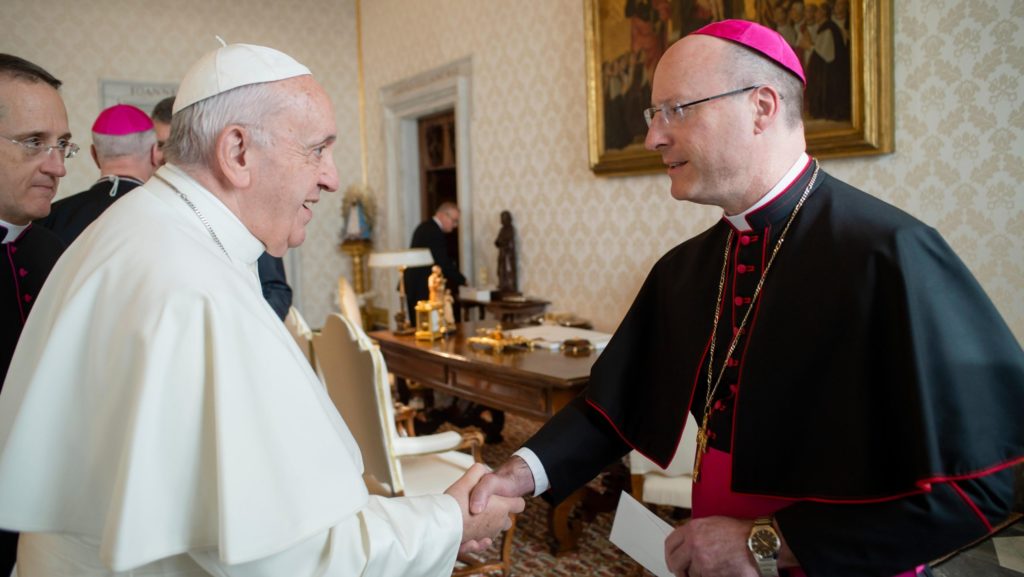Pope Francis has accepted the resignation of Archbishop Joseph F. Naumann of Kansas City, Kansas, and named Bishop W. Shawn McKnight of Jefferson City, Missouri, as his successor.
The resignation and appointment were announced by the Vatican on April 8.
Archbishop Joseph F. Naumann was installed as the fourth archbishop and the 11th bishop of the Archdiocese of Kansas City on Jan. 15, 2005. The St. Louis native was ordained a priest in 1975 and made an auxiliary bishop of his hometown in 1997.
The archbishop has championed pro-life causes, including his own vigorous opposition of the death penalty as a son robbed of his father by murder. Archbishop Naumann previously served as chair of the U.S. Conference of Catholic Bishops' Committee on Pro-Life Activities. He adopted as his episcopal motto, "Vitae Victoria Erit" ("Life will be victorious").
On June 4, 2024, he turned 75, the age at which canon law requires bishops to submit their resignation to the pope.
Archbishop McKnight, 56, has headed the Diocese of Jefferson City since February 2018, when he was ordained bishop. He was executive director of the Office for Clergy and Consecrated Life of the U.S. Conference of Catholic Bishops between 2010 and 2015.
At an April 8 press conference hosted by the Archdiocese of Kansas City, Archbishop McKnight said the call he had received from apostolic nuncio Cardinal Christophe Pierre informing him of his appointment was "a graced moment" -- one that renewed "my sense of being on mission, like many who have come before me."
He also said the archdiocese "has been in my thoughts and prayers ever since I got the call," especially amid the April 3 shooting death of archdiocesan priest Father Arul Carasala.
"In this moment of sorrow, I'm especially grateful for the opportunity Archbishop Naumann and I had earlier today in his residence's chapel to celebrate together, just the two of us, a Mass for the clergy and faithful of our beloved archdiocese, and for the soul of our brother, Father Arul," said Archbishop McKnight.
He also thanked the faithful of the Diocese of Jefferson City, saying, "You are my first diocese as a bishop, and always will be. I'm grateful for the ways you helped to form me into the bishop that I am today."
In an April 8 statement posted by the Diocese of Jefferson City, the archbishop said "that bond will always hold a special place in my heart. I am thankful for your trust, your prayers, and your dedication to living out the Gospel in your communities."
As he prepares to transition to Kansas City, Archbishop McKnight said to his Jefferson City flock, "I am confident that God's providence will continue to guide and bless you in the days ahead. You will always remain in my heart and in my prayers."
During his episcopal career, Archbishop McKnight has addressed the issue of clerical abuse as part of the "long-standing Catholic social teachings require that we afford a preferential option for the poor." In a 2018 media conference, he explained "this is most especially the case for those who have been victimized by the clergy of our own church."
In November 2018, he released a list of credibly accused clergy, naming 33 priests and religious brothers who had served in the Diocese of Jefferson City.
"Today there can be no secrets in our diocese," he said at the time, adding, "I pledge to put the care of victims, their loved ones and their communities first and foremost."
While the accusations against those on the list referenced incidents dating to 1997 and earlier, "the pain caused is still a present reality for the survivors of abuse and their loved ones," then-Bishop McKnight said at the time.
More recently, Archbishop McKnight showed his support for Pope Francis' call for synodality in the Catholic Church.
On April 5, he issued a decree "On the Pastoral Use of Liturgical Music in the Diocese of Jefferson City," following an "extensive consultation" that included almost 300 participants in synodal listening sessions and close to 7,000 diocesan respondents to a survey conducted by the Center for Applied Research in the Apostolate at Georgetown University.
Those consultations followed an initial decree by then-Bishop McKnight to remove doctrinally deficient hymnody in the diocese, following guidance in a 2020 report from the USCCB's doctrine committee, "Catholic Hymnody at the Service of the Church: An Aid for Evaluating Hymn Lyrics."
However, he rescinded the first decree, which had prompted criticism, in favor of a synodal process on the issue of liturgical music.
The April 5 decree mandated that four common Mass settings selected by the diocese for its liturgies be widely used to promote broad participation, while upholding a ban on the use of music by composers found guilty or credibly accused of sexual abuse.

